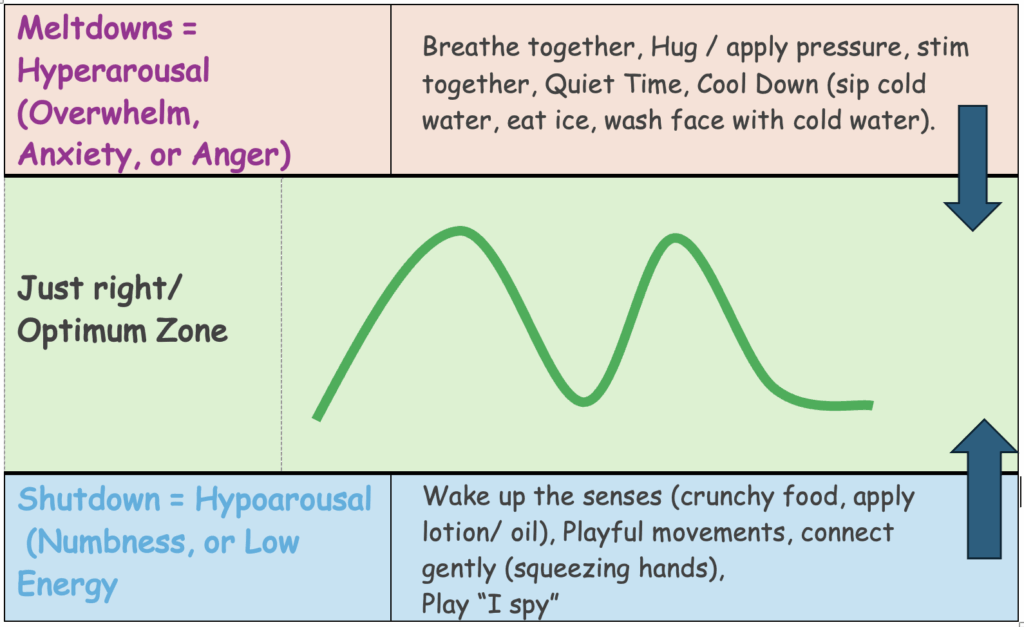Parenting as neurodivergentAn individual whose brain functions differently from the (usually neurotypical) perception of what is “normal”. For example, an individual with autism, Asperger's syndrome, dyslexia, dyscalculia, dyspraxia, ADHD, OCD or Tourette Syndrome. people or raising neurodivergentAn individual whose brain functions differently from the (usually neurotypical) perception of what is “normal”. For example, an individual with autism, Asperger's syndrome, dyslexia, dyscalculia, dyspraxia, ADHD, OCD or Tourette Syndrome. children often means our brains work differently—and the usual “rules” don’t fit. When meltdowns (ours or our kids’), shutdowns, or overwhelm happen, it doesn’t mean we’re failing. It just means our brains need different support.
What Is Our Window of ToleranceUnderstanding or accepting the beliefs, opinions or practices of others that differ from our own.?
Think of it as our brain’s “just right” zone, where:
✔ Emotions feel manageable
✔ We can think clearly
✔ Daily stress doesn’t knock us off balance
When we’re inside our window, we feel calm and can handle life’s ups and downs. The bigger our window, the more we can tolerate without feeling overwhelmed.
If we get pushed outside this window, we might feel anxious and hyper (fight-or-flight) or shut down and feel numb (freeze).
For neurodivergentAn individual whose brain functions differently from the (usually neurotypical) perception of what is “normal”. For example, an individual with autism, Asperger's syndrome, dyslexia, dyscalculia, dyspraxia, ADHD, OCD or Tourette Syndrome. families, this window is often narrower and more sensitive. We might notice:
🔺 Meltdowns – emotions flooding over (overwhelm, anxiety, or anger)
🔻 Shutdowns – zoning out, going quiet, or feeling drained
Why This Happens
Our neurodivergentAn individual whose brain functions differently from the (usually neurotypical) perception of what is “normal”. For example, an individual with autism, Asperger's syndrome, dyslexia, dyscalculia, dyspraxia, ADHD, OCD or Tourette Syndrome. brains process stress differently:
- ADHD – Our nervous systems react faster and stronger
- AutismA complex developmental condition which can significantly affect verbal and non-verbal communication and social interaction in a range of ways. – We often have bigger stress hormone responses
- Sensory differences – Everyday sounds, lights, or textures can feel overwhelming
This isn’t our fault. Our brains just work differently.
Important Note: Every neurodivergentAn individual whose brain functions differently from the (usually neurotypical) perception of what is “normal”. For example, an individual with autism, Asperger's syndrome, dyslexia, dyscalculia, dyspraxia, ADHD, OCD or Tourette Syndrome. person is unique, and these are just some common experiences.
What Helps: Real Strategies from Our NeurodivergentAn individual whose brain functions differently from the (usually neurotypical) perception of what is “normal”. For example, an individual with autism, Asperger's syndrome, dyslexia, dyscalculia, dyspraxia, ADHD, OCD or Tourette Syndrome. Community
(Helping ourselves and our kids return to our “just right” zone.)
1. Quick Reset for Meltdowns or Shutdowns
- Cold first – Splash our faces, hold an ice cube
- Pressure next – Use a weighted blanket, tight hug (if okay), or lie under pillows
- Move after – Rock, shake arms, or jump to release energy
2. When We’re Both Overwhelmed
- Put on a familiar show/song (same one every time helps)
- Sit near each other (no talking needed)
- Do separate calming things (we colour, they use putty)
3. Stop Overload Before It Starts
- After-school downtime – 30 mins with no demands
- “No questions” rule when tired (use simple statements instead)
- Sensory menus – List what calms each of us (it’s different for everyone!)

(The diagram above shows how strategies can help us return to our “just right” zone.)
When Things Feel Too Much
- Name it: “I’m feeling overloaded” (helps kids learn too)
- Simplify: Frozen meal instead of cooking? Fine. Screen time to cope? Also fine.
- Repair later: If we snap, we say sorry when calm—it models honesty.
Practical Tips for Our Family
- Model Calm: Our kids mirror us—we take deep breaths when stressed.
- Keep It Simple: Even 1–2 minutes of co-regulation helps.
- Practice Often: Use these strategies daily, not just during meltdowns.
What to Say
- “I see you’re upset. Let’s breathe together first.”
- “Want a hug or to stomp it out?”
- “Now, let’s name 3 things we see…”
Remember: We don’t have to force these tips. Sometimes our kids are too upset, and sometimes we’re too stressed to help. That’s okay.
Just being there is enough. Our first job is to calm ourselves. These are ideas to try later when things are calmer.
We’re Doing Better Than We Think
Success in our neurodivergentAn individual whose brain functions differently from the (usually neurotypical) perception of what is “normal”. For example, an individual with autism, Asperger's syndrome, dyslexia, dyscalculia, dyspraxia, ADHD, OCD or Tourette Syndrome. family looks different:
✔ Getting through the day without a meltdown = win
✔ One decent meal = win
✔ Noticing overwhelm early sometimes = win
There’s no “right” way to run our family. We navigate an inflexible world while staying true to our needs—and that’s courage.






